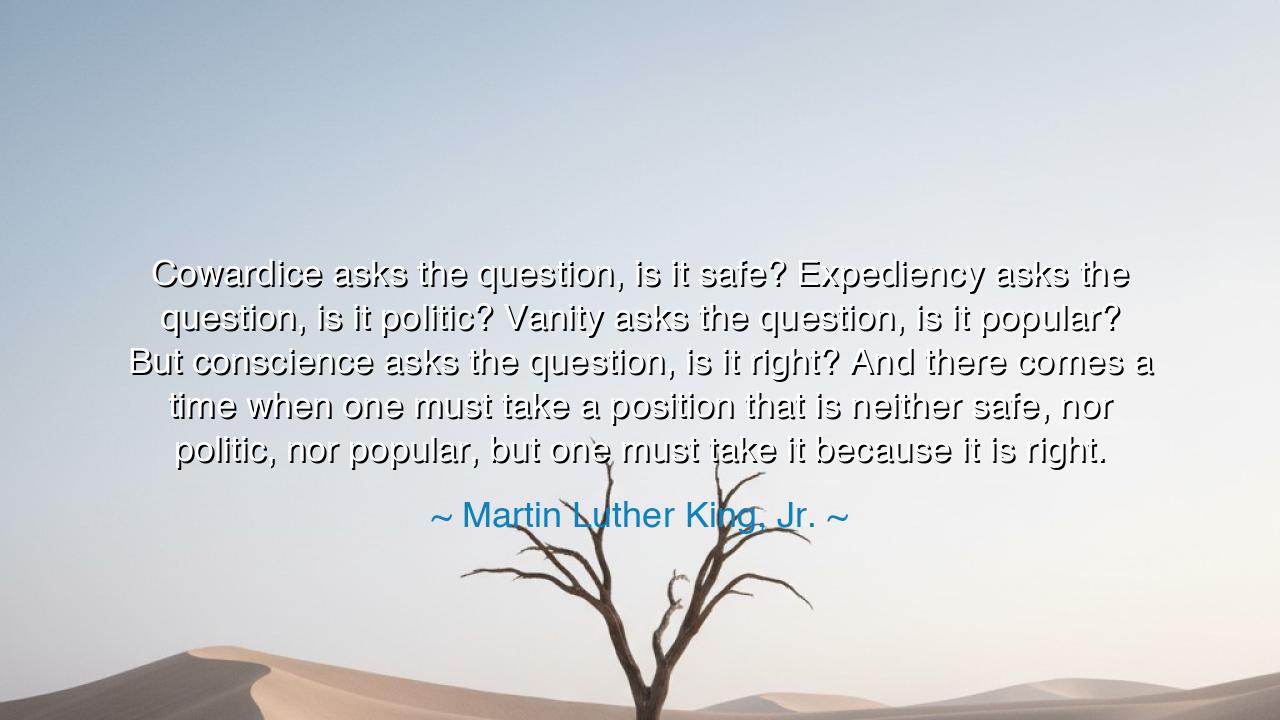
Cowardice asks the question, is it safe? Expediency asks the
Cowardice asks the question, is it safe? Expediency asks the question, is it politic? Vanity asks the question, is it popular? But conscience asks the question, is it right? And there comes a time when one must take a position that is neither safe, nor politic, nor popular, but one must take it because it is right.






The words of Martin Luther King, Jr., “Cowardice asks the question, is it safe? Expediency asks the question, is it politic? Vanity asks the question, is it popular? But conscience asks the question, is it right? And there comes a time when one must take a position that is neither safe, nor politic, nor popular, but one must take it because it is right,” resound like the toll of a great bell across the ages. They are not gentle musings, but a call to arms for the soul, summoning us to rise beyond fear, beyond calculation, beyond the hunger for approval, and to stand firmly upon the rock of conscience. In these words, King reveals the eternal battle between self-preservation and moral duty, between the fleeting applause of men and the enduring judgment of truth.
The origin of this quote lies in King’s sermons and speeches during the fiery crucible of the Civil Rights Movement. He spoke not only to inspire his people, but to remind them—and himself—that the path of justice is often strewn with danger, rejection, and hardship. King lived this reality: threatened by death, spied upon by his government, opposed even by moderates who urged patience. Yet he declared that when the hour of decision arrives, the true measure of a person is not whether they choose the safe, the expedient, or the popular course, but whether they heed the voice of conscience whispering, “Do what is right.”
The ancients, too, gave voice to this eternal struggle. Socrates, standing before the tribunal of Athens, refused to renounce his pursuit of truth though it cost him his life. He did not ask if it was safe, or politic, or popular; he asked only if it was right. Likewise, the Hebrew prophets—Isaiah, Jeremiah, Amos—spoke words of fire against kings and nations, knowing that their stance would earn them exile or death. King’s words place him in this lineage of the prophets, men and women who placed conscience above all else, and who accepted suffering as the cost of obedience to truth.
History gives us shining examples. Consider Dietrich Bonhoeffer, the German pastor who resisted Hitler’s tyranny. Many in his time chose silence, for it was safer; others sought compromise, for it was politic; still others cheered Hitler, for it was popular. But Bonhoeffer asked the question of conscience: is it right? His answer led him into the resistance, into prison, and at last to the gallows. His life and death echo King’s teaching—that the cost of righteousness is high, but its worth is eternal.
The meaning of this teaching is clear: in the great moments of life, we are tested not by what we know, but by what we choose. The easy paths will always beckon: safety will tempt us to silence, expediency to compromise, vanity to conformity. Yet none of these will satisfy the soul. Only the path of conscience, though steep and lonely, leads to peace within and honor without. For when we choose what is right, we align ourselves not with the fleeting winds of human approval, but with the eternal current of justice itself.
The lesson is thus: let conscience be your guide, even when it leads into danger, even when it isolates you, even when it costs you dearly. For safety passes, popularity fades, politics shift, but truth remains. A man who chooses right over comfort may suffer in the moment, but he leaves behind a legacy that endures beyond the grave. King himself paid the ultimate price, yet his words still stir hearts across the world, long after those who opposed him have been forgotten.
Practical action flows from this wisdom. In your own life, when faced with choices, ask not first what is safe, convenient, or popular, but what is right. Train your heart to listen for the voice of conscience, and when you hear it, obey it, even if your knees tremble. Begin in small things: speak truth where others whisper lies, defend the weak when it is inconvenient, act with honesty when deception seems easier. In these daily acts of courage, you prepare yourself for the greater trials, when history itself may call upon you to stand.
Thus, in the voice of the ancients, we proclaim: Blessed are those who choose conscience over comfort, for they are the true builders of justice. Blessed are those who take a stand though the world opposes them, for they walk in the company of prophets and martyrs. And let us remember always the wisdom of Martin Luther King, Jr.: that the measure of a life is not safety, expediency, or popularity, but the courage to do what is right, even when it costs everything.






AAdministratorAdministrator
Welcome, honored guests. Please leave a comment, we will respond soon